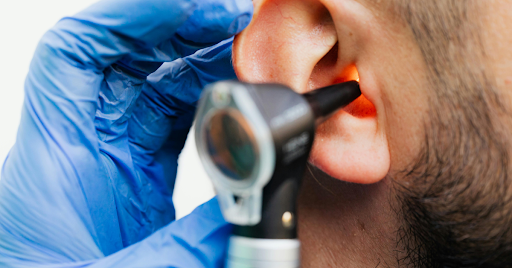Best Home Remedies for a Runny Nose
4 min read
By DocGenie , Published on - 27 January 2025 A runny nose can be more than just an annoyance—it can interfere with your daily routine, impact your sleep, and sometimes signal underlying health issues. Whether it's triggered by a cold, allergies, weather changes, or irritants, finding effective home remedies can provide much-needed relief without relying heavily on over-the-counter medication.
A runny nose can be more than just an annoyance—it can interfere with your daily routine, impact your sleep, and sometimes signal underlying health issues. Whether it's triggered by a cold, allergies, weather changes, or irritants, finding effective home remedies can provide much-needed relief without relying heavily on over-the-counter medication.In this guide, we’ll explore tried-and-tested home remedies, identify common causes, and share helpful prevention tips to manage a runny nose naturally.
What Causes a Runny Nose?
 Understanding the root cause of your runny nose is key to choosing the right remedy. Some of the most common reasons include:
Understanding the root cause of your runny nose is key to choosing the right remedy. Some of the most common reasons include:- Viral infections (like the common cold or flu)
- Seasonal allergies (e.g., pollen, dust mites)
- Sinus infections
- Irritants like smoke, perfume, or pollution
- Cold weather
- Overuse of nasal sprays (rhinitis medicamentosa)
How to Stop a Runny Nose Immediately?

- When you need quick relief, try the following steps:
- Blow your nose gently to remove excess mucus
- Use a warm compress on your sinuses
- Stay hydrated to thin the mucus
- Try a steam inhalation for 10–15 minutes
- Use a saline nasal spray to rinse allergens or irritants
While these won’t “cure” the root cause instantly, they can offer immediate relief by clearing nasal congestion and soothing irritation.
Top Home Remedies for a Runny Nose
Here are the most effective, safe, and science-backed remedies to treat a runny nose at home:- Steam Inhalation Steam loosens mucus and soothes irritated sinuses.
- Boil water and pour it into a bowl
- Drape a towel over your head
- Inhale the steam for 10–15 minutes Optional: Add a few drops of eucalyptus oil or menthol for better results.
- Hydration is Key Drink plenty of water, warm teas, or clear broths. Fluids help thin mucus and reduce nasal blockage.
- Ginger tea with honey
- Warm lemon water
- Herbal teas (like chamomile or peppermint)
- Nasal Irrigation (Neti Pot or Saline Rinse) Nasal irrigation is one of the best ways to flush out allergens, excess mucus, and irritants.
- Use a sterile saline solution
- Tilt your head and pour it into one nostril
- Let it drain from the other side
- Warm Compress
- Soak a cloth in hot water
- Wring out excess
- Apply for 10–15 minutes, 2–3 times daily
- Spicy Foods Consuming spicy foods like chili, horseradish, or wasabi can temporarily open nasal passages and allow mucus to drain.
- Honey and Ginger Both honey and ginger have anti-inflammatory and antimicrobial properties.
- Mix 1 tsp of honey with ½ tsp of grated gingerConsume twice a day This combo soothes the throat and helps clear nasal congestion.
- Vitamin C-Rich Foods Vitamin C helps boost immunity, reducing the duration of colds.
- Oranges, lemons, kiwi, bell peppers, amla (Indian gooseberry) A daily intake of these foods can help your body fight infections more effectively.
- Essential Oils Some essential oils have decongestant properties.
- Eucalyptus oil
- Peppermint oil
- Tea tree oil Use a diffuser or add a few drops to hot water for inhalation.
- Turmeric Milk (Golden Milk) Turmeric has powerful anti-inflammatory and antibacterial properties.
- Add ½ tsp turmeric to warm milk
- Mix in a pinch of black pepper for better absorption Drink before bedtime for added comfort and faster recovery.
How to do it:
Try:
Steps:
- Applying a warm compress over your sinuses (forehead and nose) helps loosen mucus and relieves pressure.
However, avoid this if you have a sore throat or acid reflux.
Recipe:
Sources:
Effective oils:
Recipe:
What to Avoid During a Runny Nose
To ensure your symptoms don’t worsen, avoid the following:- Cold beverages and ice creams
- Dry air or dust
- Strong perfumes or aerosols
- Smoking or secondhand smoke
- Overuse of nasal decongestant sprays
When to See a Doctor?
While most runny noses resolve within a week, you should consult a doctor if you notice:- Runny nose persisting for more than 10 days
- Green or yellow nasal discharge with fever
- Facial pain or swelling
- Symptoms of sinus infection or bronchitis
- Blood in nasal discharge
Preventing a Runny Nose
Tips to reduce the frequency of runny noses:
- Wash hands frequently
- Use air purifiers at home
- Avoid allergens if you're prone to allergies
- Stay hydrated and eat immune-boosting foods
- Use a humidifier in dry weather
- Wear a mask in polluted environments



